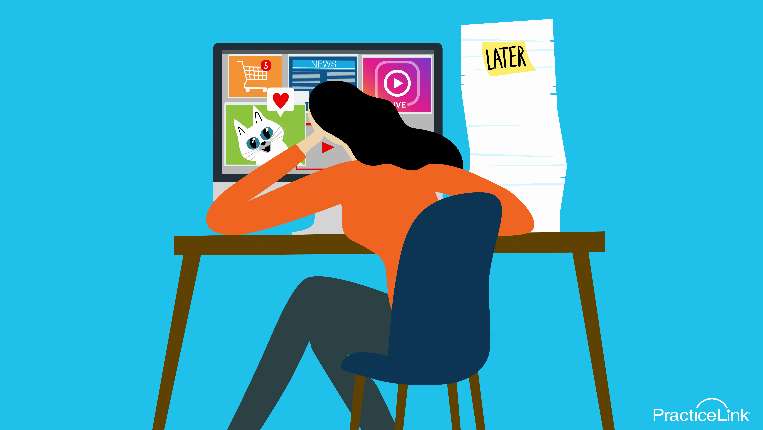Want to overcome procrastination? Why wait?
 Posted by Drew Terry
Posted by Drew Terry

Do you work on a project the moment it’s received, or does taking action require the pressure of a looming deadline?
Everyone has procrastinated about something in life. Many people even jest about "performing best under pressure." However, putting off necessary work is a chronic problem for many Americans, and procrastination may be permeating more parts of life as the COVID-19 pandemic persists.
Fortunately, there are some ways to stop stalling and start building momentum toward completing that to-do list.
What is procrastination?
Procrastination is intentionally avoiding doing something that needs to be done. According to Merriam-Webster, it often implies blameworthy delay, especially through laziness or apathy.
This is different from prioritization, which is determining what order to complete a series of tasks based on factors like importance, the time it will take to complete, deadlines of associated tasks, and whether it impacts someone else’s work.
Why do we procrastinate?
The reasons people procrastinate vary greatly. It could be as simple as the task being boring. On the other hand, it might be because it’s too hard, you’re unsure how to get started, or maybe you’re afraid of failing.
Think of instances in your personal or professional life when you may have procrastinated. Maybe you:
- Put off filing an expense report because it was larger than normal and required tracking down receipts from multiple locations.
- Dread calling a candidate to let them know they didn’t get the job.
- Are ignoring a leaky water heater in the hopes it’s an anomaly or nothing serious.
- Made a mistake while entering data and are nervous about the response of a peer or supervisor when they find out.
The effects of procrastination
Procrastination may not cause a problem in the short term, but issues are more likely to arise the longer it persists. Eventually, falling into that same trap could lead to poor work performance, strained relationships and even stress. Using the examples above, procrastination might result in:
- Finding inaccurate charges on your hotel receipt, causing you to miss the deadline to submit your expense report.
- Delaying the conversation to a point where a candidate is left uncertain of their status or it is even more awkward when you finally deliver the news.
- Arriving home to discover a burst water heater and widespread water damage.
- Having someone else discover the data error, which caused an even bigger issue that could have been avoided if the team was alerted earlier.
Benefits of beating procrastination
On the other hand, starting on tasks earlier vs. waiting until time demands your attention can have the benefit of better outcomes for you and your performance. By starting earlier, you could have:
- Identified the billing issue with plenty of time to notify the hotel and receive a revised receipt to include in your expense report.
- Entered a difficult conversation with the details still fresh in your head, allowing you to communicate more clearly and prevent the anxiety of one difficult task from negatively impacting other things on your to-do list.
- Scheduled a repairman to fix the leak and minimize repair costs.
- Helped the data team correct the mistake before it impacted a customer, making it more of a learning opportunity vs. a bigger hole of which to dig out.
How to overcome procrastination
The various ways to overcome procrastination may be as numerous as the ways to procrastinate. In general, it’s about getting started and finding ways to remain motivated to finish the task. A few considerations include:
- Breaking larger projects into smaller chunks that seem easier to complete individually.
- Creating milestones, setting reminders to stay on schedule and finishing tasks before they’re due.
- Organizing your to-do list into a detailed outline to help get your brain thinking in the right space and working toward a solution.
- Using peers to hold you accountable.
- Silencing cellphones, closing email and instant messaging windows, and eliminating other distractions.
- Changing your work environment to help you refocus.

